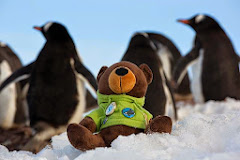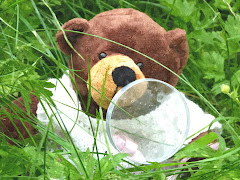Great to be taking part again in the EYE Eco Summit (EYE = Eco Young Engaged). http://www.eyeproject.co.uk/about-us Following the 9th annual Worthing & Adur Eco Summit this is the first event for schools in the west of the county which was held at the Weald and Downland Open Air Museum.
During the day, participating schools took part in a variety of workshops including Living Wage Game, Importance of pollinators, energy misuse and saving energy, importance of water conservation and others. the participating schools could chose 3 workshops to take part in - including our workshop One Ocean - focusing on the benefits we get from the ocean and ways that we are impacting our climate.
Using a presentation of Ed the Bear and the One Ocean Project I introduced the pupils to the concepts around benefits we receive from the ocean using examples from Ed the Bears travels. Then used examples from Ed's travels to consider ways we impact our climate - this included a Q&A.
We then used this as a start point for the pupils to create an infographic, group 1 focused on the benefits and group 2 ways that we impact our climate
Infographic
1
Pupils
considered how we benefit from the ocean. In a nut shell we discussed benefits
such as how the ocean creates and moderate our climate and weather.
From Workshop 1
How plant
plankton produce 50% of the oxygen we breathe and in turn remove a million tons
of carbon dioxide a day from the atmosphere. How the ocean provides freshwater
via the water cycle – creating and replenishing freshwater habitats, providing
water for us to drink, to grow crops etc.
From workshop 2
We looked at how 50% of the food we
eat (globally) comes from the ocean and how the ocean allows us to transport
90% of our goods around the globe. The oceans are a great provider of wellbeing
and fun activities. They are also a great potential source of renewable energy.
From workshop 3
We also considered what creates wind and waves.
Infographic
2
Because it
would be too big a topic to look at all the ways we impact the ocean, we focused on how humans impact our climate.
Pupils started
from the point that out main impact was from burning fossil fuels causing
climate change. From there the pupil’s problem solved (with a bit of help and
guidance) what impact this might have.
From workshop 1
This included sea level rise from
melting ice caps (and I added to this thermal expansion the cause of 50% sea level
rise so far, when water warms it expands). They considered how man made climate
change would cause some places to have droughts while other places will flood.
How increase in tropical storms will impact our weather in the UK – rain is
good but too much rain means we get all the negative aspects (affecting us, crops,
freshwater habitats) but few of the benefits.
From Workshop 2
We looked at how sea level rise
could cause other problems - such as increased coastal erosion. 40% of the
global population live close to the coast. The pupils looked at how a rise in
sea temperature is damaging habitats such as coral reefs, disrupting food webs
by creating changes in the distribution of some animals.
From Workshop 3
People cause climate
change but they can also be part of the solution.
We finished
the workshop where we started – what does the ocean have to do with sustainable
schools, by the pupils identifying which elements of each infographic was relevant to sustainable schools and which
aspects could sustainable schools have a positive effect.
To help cement the idea
that the problems we cause through man made climate change are caused by impacting
on the natural processes that provide the benefits we get from the ocean – each
group shared their infographic with each other.
During the lunch break teachers and pupils visited our stands.
At the end of the day a presentation shared some of the good practices and projects that the various schools had instigated in their own grounds. There were also certificate for best reuse of items. The day finished with each workshop sharing in a 2 minute the results of their workshops.
It was a great day and amazing buzz from the children. The children in my workshops did a great job of problem solving these issues.








